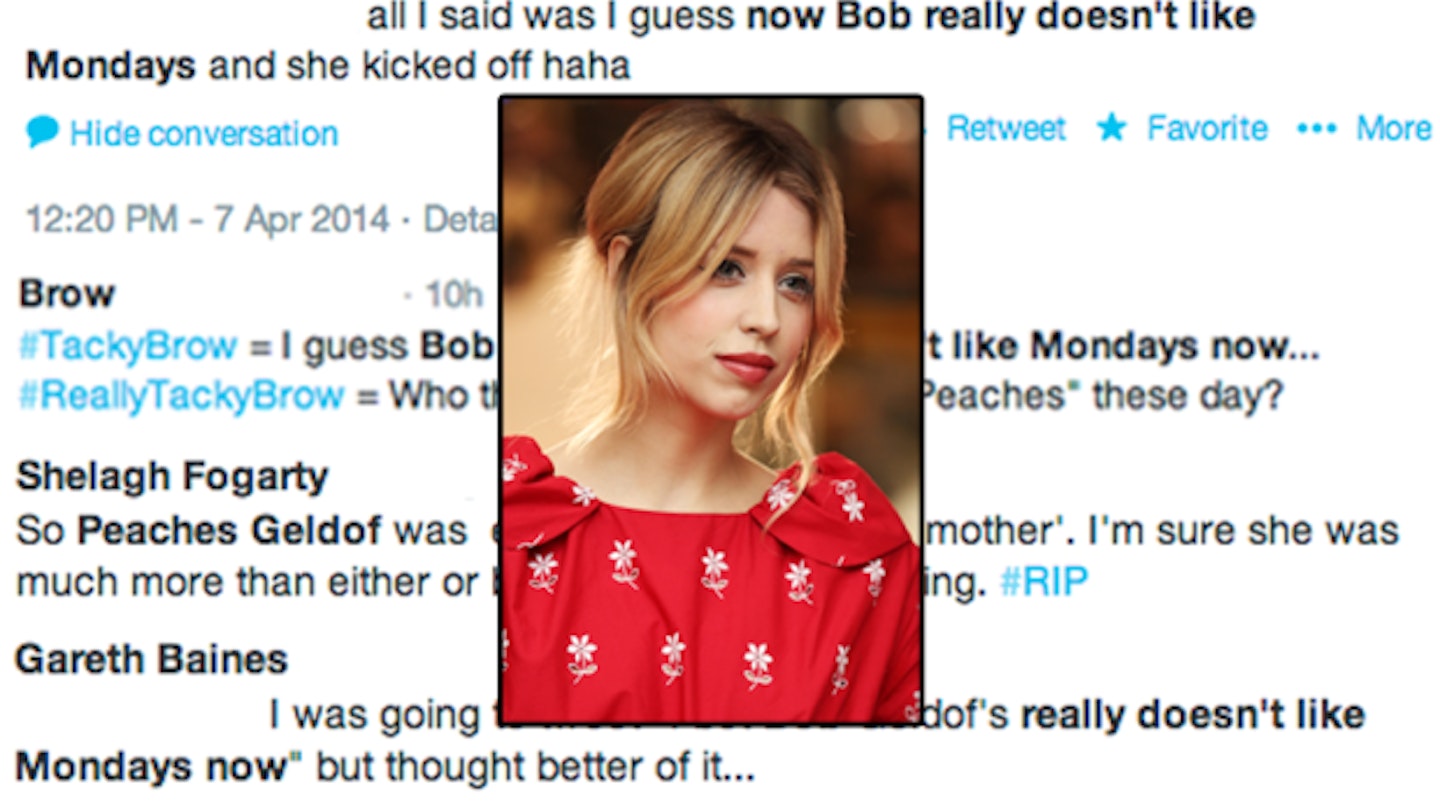Where were you when you heard that Amy Winehouse or Philip Seymour Hoffman or Peaches Geldof had died? Was it scrolling through Twitter, Instagram or Facebook on your iPhone? Today it’s virtually always via social media that we learn of the death of a public figure – and it’s on social media that we watch and wade into the mass outpouring of public grief. If last night you found yourself damp-eyed, tirelessly scrolling through tributes that all say the same thing (#RIPPeaches) to see if you’ve missed anything, when you know you can’t have, you certainly weren’t alone.
Within 90 minutes of the initial @BBCBreaking tweet ‘Peaches Geldof, the daughter of Bob Geldof and Paula Yates, has died at the age of 25’, her name topped the list of trending topics and over 200,000 people had commented on the news. My phone pinged with WhatsApp messages of the ‘Peaches Geldof WTF’ variety, Facebook was flooded by YouTube clips of her ITV takedown of Katie Hopkins on the subject of attachment parenting, and childhood images of Peaches with Paula filled my Instagram feed. Her Twitter followers grew by 40,000 within 30 minutes of the news breaking, and someone had even updated her Wikipedia page 16 minutes after that first, tragic @BBCBreaking tweet. Evidently, we all feel compelled to add something new to the conversation, to feel part of it – even though we never actually met her.
Her Twitter followers grew by 40,000 within 30 minutes of the news breaking, and someone had even updated her Wikipedia page 16 minutes afterwards
But do we really need to feel bad about ‘Mob Mourning’ or ‘Grief Groupiedom’ – that very public overflow of emotion that seems to now greet any famous death in the digital world? In a word, no. Whilst it’s regularly treated with derision and dismissed as false and theatrical, psychologists actually recognise that the emotional proximity we feel to celebrities is entirely real, and our grief perfectly valid. ‘In fact, the idea that grief is a private emotion felt only for those you were personally attached to only developed in the twentieth century,’ psychologist Charles Figley tells The Debrief. ‘For centuries beforehand, people understood that mourning is a more complex thing and the higher the status (which now includes political, social or celebrity status) of the deceased, the more turned out to mourn. In the past, the whole village would assemble to mourn the passing of the lord of the manor. What we’re seeing today on Twitter is actually nothing new – it’s just more public.’
“Hearing ourselves talk” is all part of the process, helping us figure out what just happened
So don’t let anyone make you feel like a weirdo for being cut up about Peaches. It’s normal to be shocked and confused about the death of a woman we grew up with, albeit in a distinctly 21st century way. We might never have met her, but we’ve talked about her, worried about her, wondered what her life is really like, smiled at her family snaps on Instagram, wanted the best for her – of COURSE we’re gutted about this desperately sad ending. It’s also natural to need to talk about it. ‘Any traumatic event will trigger sympathy, empathy, identification and transference,’ says Figley. ‘And “hearing ourselves talk” is all part of the process, helping us figure out what just happened.’
Depressingly, though, mixed in with the sadness, shock and compulsion to ‘make sense of it all’ is a relentless torrent of prurient glee, pointless speculation and cruel jibes. When a celebrity dies, Twitter is an emotional minefield; you never know when your eyes will fall on something so vicious, twisted or maddeningly stupid that you want to go lie on the floor and despair for all humanity. (FYI, no prefacing a sick joke like ‘Now Bob REALLY doesn’t like Mondays’ with the words ‘too soon???!!’ doesn’t make it any less distasteful). Weirder still, are people clamouring to say something about Peaches whilst loudly insisting that they never rated her. You know the tweets of the: ‘I was never really a fan of Peaches Geldof but…’ variety. Gee, thanks for your moving tribute.
These vile comments are all the more maddening given that social media could be a useful space to pay tribute to Peaches, to share memories, to come to terms with it all. Because no, there is nothing phony about being moved by the death of a bright, feisty 25-year-old mother, and worrying about the impact on her sisters, sons, father, husband and friends – faces we’re also familiar with. Just leave the guesswork and the gags to the assholes. Because, as we’re reminded each time a public figure dies, the internet has no shortage of assholes.
**Follow Anna on Twitter @AnnaDotHart
**
Picture: Getty
This article originally appeared on The Debrief.
